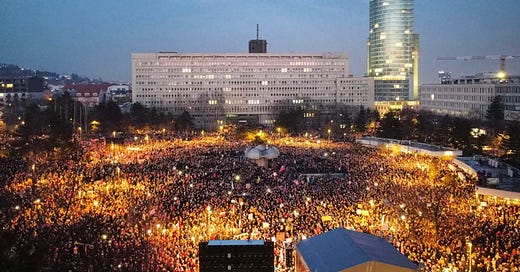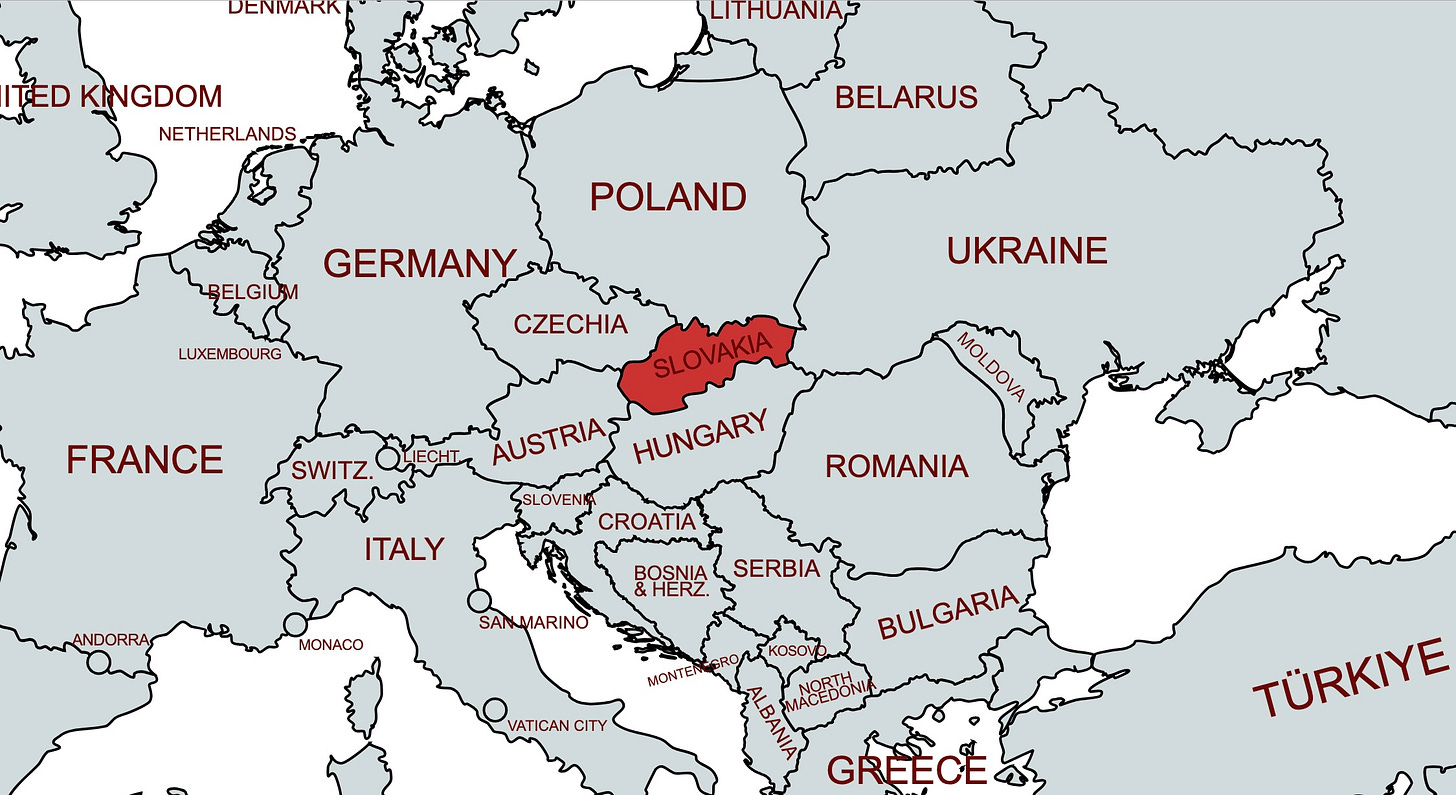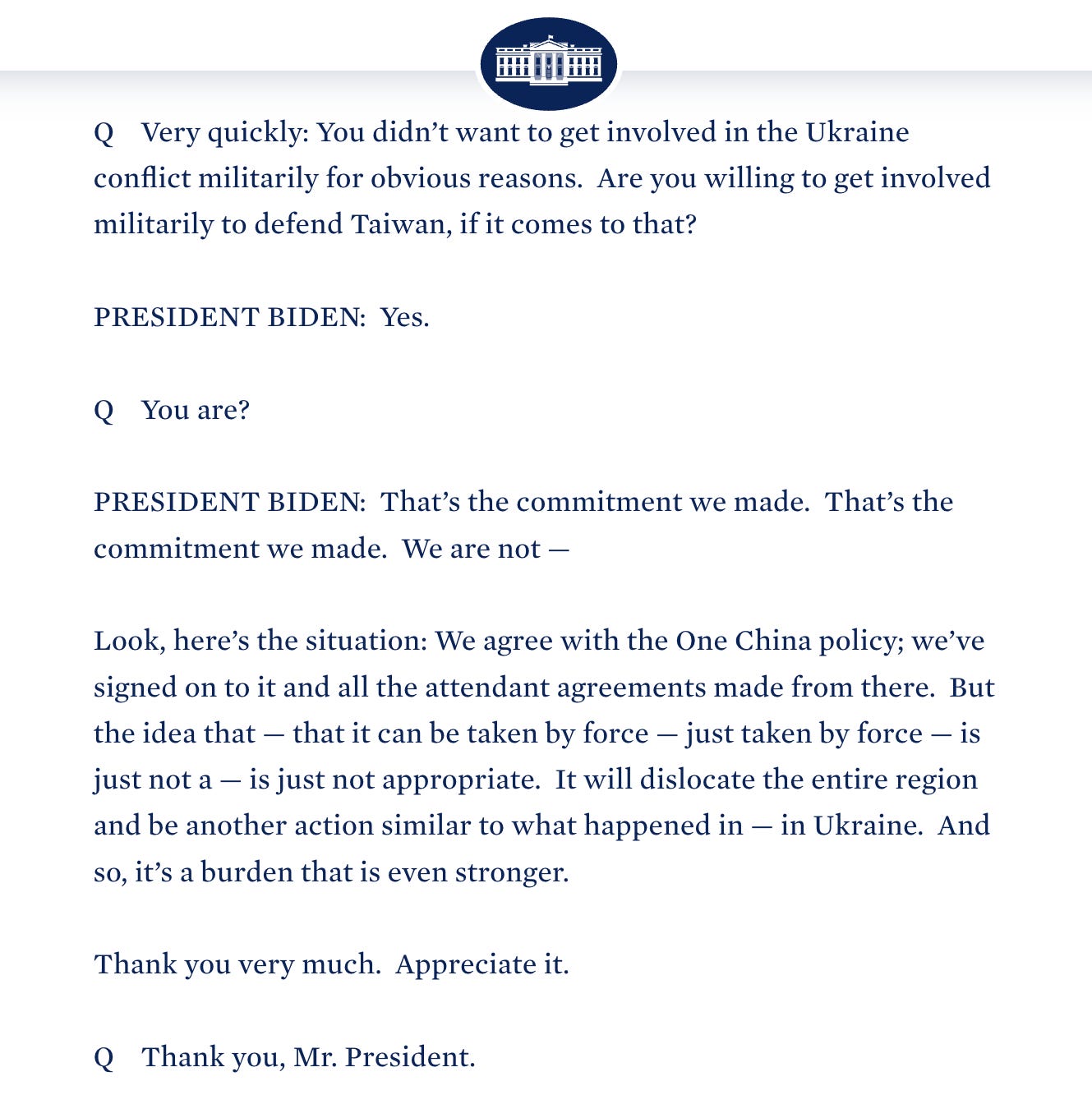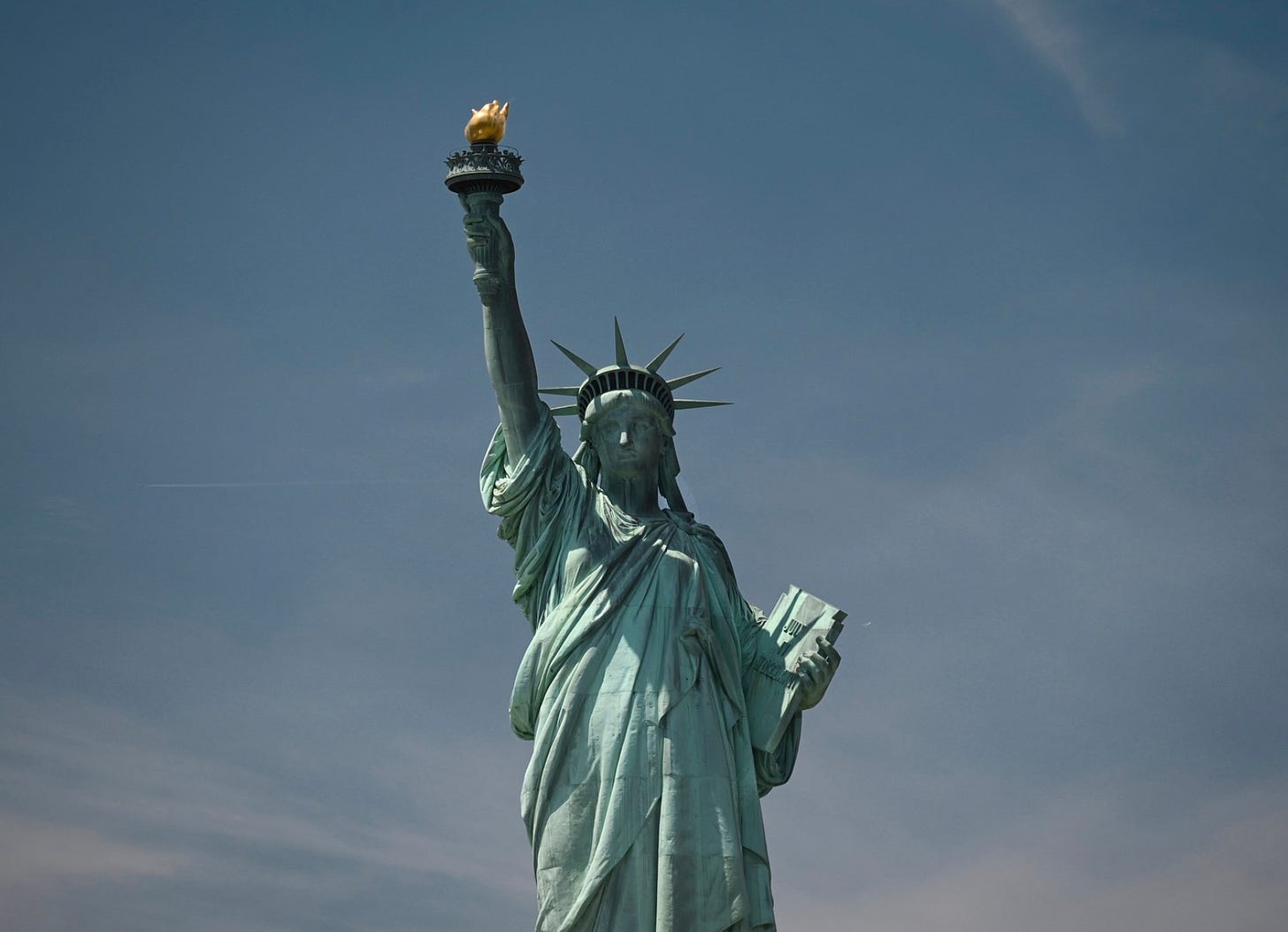Hi, welcome. Every week Common Sense and Whiskey takes a short, smart look at the world out there. This week, trouble in Slovakia reminds us what a brilliant judge of people President Trump is. We consider Manifest Destiny and its unintended consequences, and there’s a handy, play at home guide to the failure of democracy. Tell me what you think at billmurraywriter (at) gmail.com. Thanks for reading. Here we go:
SLOVAKIA President Trump’s attempts to consolidate power in the executive branch this week will ring the envy bell in Grassalkovich Palace in Slovakia. This photo is from a protest against the Prime Minister in the Solvakian capital Bratislava, a week ago today.
If you’ve never been to Slovakia (a healthy majority of the world’s people, surely) you might be forgiven for lumping the name ‘Bratislava’ into that big dark bucket of historically East European, kind of foreboding, Slavic-sounding capitals.
You shouldn’t. Located on a bend in the Danube, like its neighbor Budapest about a hundred miles downstream, Bratislava is an easy day trip outside that world capital of culture, Vienna, just an hour and three stops on the train.
Slovakia’s population runs about the size metro San Diego - the entire country - so the crowds in the streets of Bratislava that night represented a measurable chunk of the country. They were protesting against Prime Minister Robert Fico (pronounced ‘Feet-so”), the sixty year old co-leader of an incipient central European Putin-friendly movement we talked about a couple of weeks back.
Prime Minister Fico traveled to meet Russian President Vladimir Putin last month in Moscow, becoming only the third Western leader to do so in three years of Russia’s war on Ukraine. Fico says Putin is ‘wrongly demonised‘ in the West. Fico, meanwhile, was rightly demonized by that protest crowd in Bratislava.
Remember when Donald Trump told us he was a brilliant judge of people, and that he would hire only the best people? Like all these?
Chiefs of Staff, Reince Priebus, John Kelly, Mick Mulvaney, Mark Meadows. National Security Advisors, Michael Flynn, H.R. McMaster, John Bolton, Robert O’Brien. Attorneys General, Jeff Sessions, Matthew Whitaker, William Barr. Defense Secretaries, James Mattis, Mark Esper, Christopher Miller. Press Secretaries, Sean Spicer, Anthony Scaramucci, Sarah Huckabee Sanders, Stephanie Grisham, Kayleigh McEnany. FBI Directors, James Comey, Andrew McCabe, Christopher Wray. Homeland Security Secretaries, John F. Kelly, Kirstjen Nielsen, Kevin McAleenan, Chad Wolf. Deputy & Acting Attorneys General, Sally Yates, Rod Rosenstein, Jeffrey Rosen. Remember them?
Sure you do. (Confession: I don’t think I’ve ever heard of Kevin McAleenan, though.)
Thanks to Robert Fico for reminding us, because it seems he, likewise, is a superior judge of people. In the news this week on team Fico: Lukáš Machala, Secretary General of the Service Office of the Ministry of Culture.
Machala was asked by journalist Peter Žatko, on the television programme, “Reportéri” (Reporters), on April 29, whether people who believe that the Earth is flat should be given a platform on the current public broadcaster, RTVS.
They should, Machala thought. And he mused about how much any of us, really, know.
“Has it been proved that the Earth is round? Have you been into outer space? No, nor have I, I don’t know,” Machala, chief of staff at the Culture Ministry, said.
Slovak astronaut Ivan Bella, who travelled into space in 1999 and spent eight days in orbit around the Earth, confirmed for the Refresher website that the planet is, indeed, round.
That wasn’t convincing to Machala, who accused his critics of portraying him as a conspiracy theorist, and called it proof that RTVS, the public broadcaster, doesn’t engage in "objective journalism”. He declared that he would no longer communicate with RTVS.
•
MERGERS AND ACQUISITIONS: Yesterday Secretary of State Marco Rubio addressed President Trump’s desire to acquire Greenland with friendly conservative talk show host Megyn Kelly, and pleaded not to have to say very much about a subject that has thoroughly roiled America’s closest allies in the European Union. He said:
“President Trump, what he has said publicly is he wants to buy it. He wants to pay for it, and how we worked on something like that, how something like that is approached, obviously is probably done better in the appropriate forums as opposed, a lot of this stuff is done publicly and it's not helpful because it puts the other side in a tough spot domestically.”
CAUTION! PANAMA IS POLITICALLY LARGER THAN IT APPEARS: The Secretary of State is off to Latin America on his first trip in that role, and Panamanian President José Raúl Mulino said yesterday that he expects to meet with Rubio on Sunday. At a press conference in Panama City yesterday he also said “I cannot negotiate, and much less open a process of negotiation, over the canal. That’s sealed. The canal belongs to Panama.”
QUICK! DEFINE MANIFEST DESTINY! A new America president, pick any, who declares an explicit policy to expand his country’s borders to, say, oh, Panama and Canada and Greenland, may face unintended consequences.
FIRST, he legitimates this week’s land grab by Rwanda, in which its soldiers have unabashedly supported rebels in seizing Goma, the main eastern city in the Democratic Republic of Congo. (Let’s maybe talk about that here next week. I’ll try to give a plausible answer to the question, “who cares?”)
President Trump’s expansionism allows Russia to put up a blizzard of whataboutism when confronted with its frozen conflicts around the world.
And something else: The United States’s public position is that it will defend Europe and Taiwan, at the same time if necessary. Even though everybody knows it’s probably not capable of doing that, in a press conference on May 23, 2022 with Prime Minister Fumio Kishida at the Akasaka Palace in Tokyo, President Biden said US would fight to defend Taiwan:
Most people think Chinese President Xi Jinping’s move on Taiwan won’t come until 2027 at the earliest. On two occasions the Chinese President Xi has publicly challenged his People’s Liberation Army to become a “world-class” military capable of winning regional wars by 2027, the 100th anniversary of its founding.
Thing is, with President Trump on the loose, talking about taking sovereign lands Panama, Canada and Greenland, by 2027 the principal tenet of behavior between states, that borders are sovereign and can’t be changed by force (a notion that has prevailed since the Peace of Westphalia settled the Thirty Years War in 1648), may just seem some quaint notion from the past.
SECOND, after failing to solve Russia’s war on Ukraine in his promised first twenty four hours, Mr. Trump will now pursue a settlement via peace talks. The sides may talk, but their various interests are a tangled mess and there’s a difference between talking and real negotiations.
In real negotiations Vladimir Putin would aim to undermine Ukrainian security by ruling out NATO membership. That is a non-starter for Ukraine. In real negotiations Ukraine would need a promise of NATO membership or at least real, tangible security guarantees from its fellow Europeans, probably with European troops inside Ukraine.
(Since Putin has recruited North Korean troops to guard Kursk, a region inside Russia that Ukraine invaded in 2024, Ukraine will argue Russia has no basis to argue against European troops inside Ukraine.)
NATO membership is a near requirement for Ukraine, out of the question for Russia, and a promise of NATO expansion is probably a non-starter for Donald Trump.
If the US really wants real negotiations, not just talk, then, it may find itself needing to help Ukraine stabilize the front lines as a way of pressuring Russia to the table. Many analysts have been predicting exactly this for some time now.
The unintended consequences here? if Donald Trump decides to take that course he will find himself in a position of relative weakness that is in part of his own doing.
Mr. Trump actively opposed a bipartisan Senate proposal that was ready for passage in early 2024, that aimed to combine increased border security measures with additional aid for Ukraine. Trump publicly and privately urged Republican lawmakers to reject the deal on the grounds that it would provide a political advantage to President Joe Biden during an election year.
Instead Trump wanted to run on the mess at the border, and prevailed on Republicans to block the proposal. This kept bipartisan border security measures from being implemented through 2024, for Trump to use in his campaign, but it also stalled for half a year aid for Ukraine, which he might wish to have had now in his role as dealmaker.
•
EL SALVADOR: Elsewhere in the orbit of the new American president, El Salvador’s President Nayib Bukele isn’t included in all surveys of world leaders’ popularity, but when he is, he usually places near the top. His formula combines increased security (His crackdown on gang violence has been wildly popular domestically) with very effective marketing.
No doubt the country’s substantial improvement in protection from drug gangs is a huge relief for everyday Salvadorans. But it has come at the cost of human rights. Here is a photo the authorities liked so much they offered it as a handout to media. It shows conditions for incarcerated gang members at one of Bukele’s jails.
We should have seen it coming. President Nayib Bukele was in DC for Donald Trump’s inauguration. And now:
•
And finally today,
A USER’S GUIDE TO THE FAILURE OF DEMOCRACY
Based on a recent NYT column by lawyer and former diplomat Norman Eisen, here’s a handy checklist so we can all play along at home as the Trump team uses the Viktor Orban playbook’s tried and true methods to dismantle the pillars - assembled over centuries - of US democracy. Call it Norm Eisen’s handy guide to the failure of democracy. The administration will be expected to:
Propose new legislation to bring the courts to heel
Consolidate power in the presidency
Change civil service laws
Elevate allies to key positions
Aggressive use of libel actions
Pack the courts
We can see the plan is well underway and making progress. In the first two weeks of his presidency Donald Trump has pulled back the curtains, rattled the sashes and thrown open the Overton windows at 1600 Pennsylvania Avenue with such force that the White House, and the country, are still shuddering two weeks later.
Still, the good news is that after two weeks watching there has been no wholesale collapse of American democacy. (Well, yes, I do think there was some question). The word ‘wholesale’ is doing a lot of work here.)
There is enough institutional strength to contest enough shenanigans quickly enough to stop, block or turn back the most egregious attempts at authoritarianism. It’s the benefit of having an old government, with institutions tested and strengthened over time, unlike, say, in Budapest, where Orban has developed the playbook. Only free of Soviet rule since 1989, Hungary hasn’t shown the institutional strength to stop an intent authoritarian. (at least, not completely).
With the quickly rescinded freeze on federal aid, this week brought the 2025 version of 2017’s ‘Muslim ban.’ In Trump’s first weeks last time around his once and current xenophobe-in-chief Stephen Miller attempted to ban arrivals based on faith, resulting in demonstrations that snarled international arrival halls at airports across the land.
•
Content is free on CS&W. There’s no paywall, but if you like what you read I’d be grateful if you’d subscribe for $5 a month or $50 a year for 2025. You tip your bellboy, don’t you? Of course you do. I have probably approximately as much insight as him. Probably. Thanks for reading. Ask your friends to subscribe. See you next week.
Bill
© 2025 Voices, Inc.













